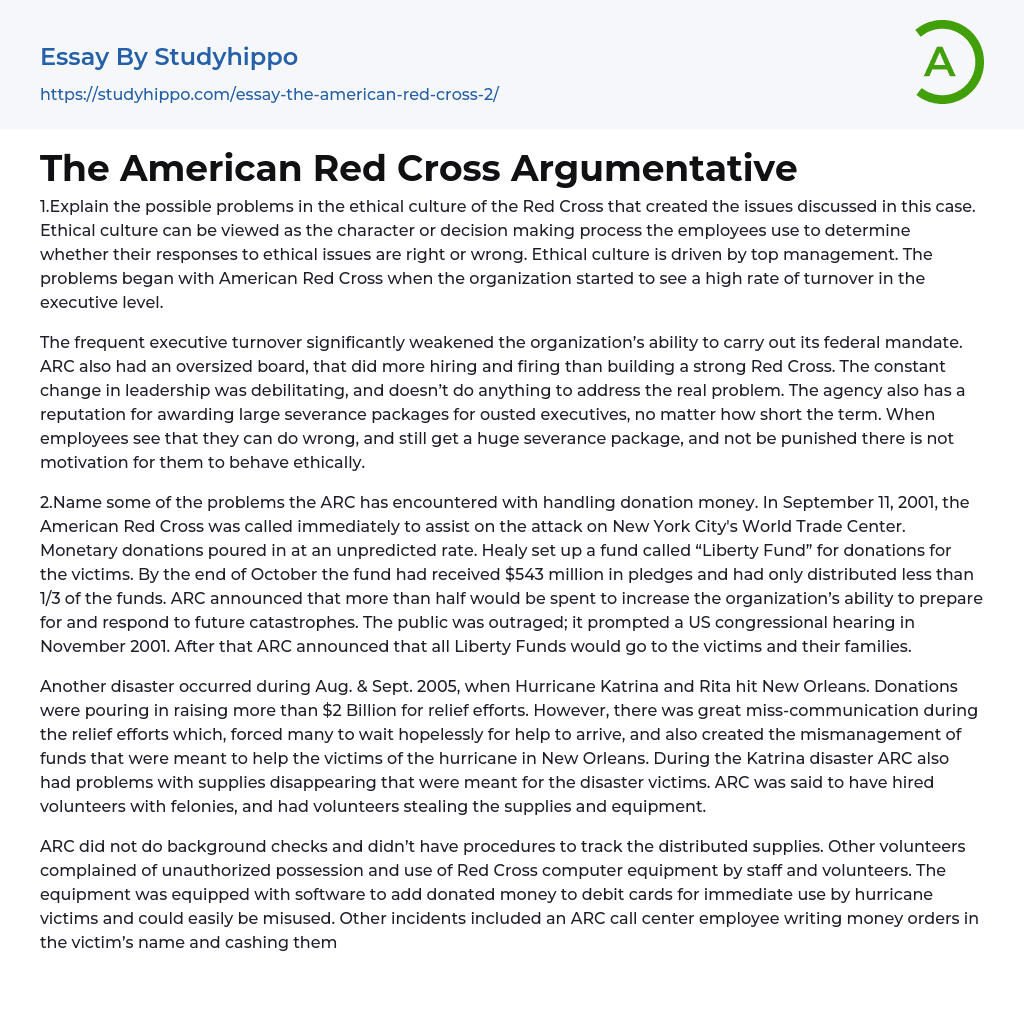The high turnover rate of executives at the Red Cross can be indicative of ethical culture issues that have contributed to the problems discussed in this case. The ethical culture of the organization is influenced by senior management and plays a crucial role in guiding employees when they face ethical dilemmas, as well as determining their perception of right and wrong.
The organization's federal mandate was significantly weakened by frequent executive turnover. Additionally, ARC's board, which was too large, focused more on hiring and firing instead of strengthening the Red Cross. The continuous leadership changes were debilitating and did not address the actual problem. The agency is also known for giving generous severance packages to removed executives, regardless of their short tenure. When employees observe that they can misbehave and still rec
...eive a substantial severance package without consequences, they lack motivation to behave ethically.
2. Managing donated money was a challenge for the American Red Cross (ARC), particularly after the September 11, 2001 attack on the World Trade Center in New York City. To tackle this issue, ARC's CEO, Healy, established the "Liberty Fund" specifically for donations intended for the victims. However, by October's end, although pledges totaling $543 million had been received by the fund, less than one-third of that amount had been distributed. To address concerns, ARC announced that more than half of the funds would be used to strengthen their ability to respond to future disasters. This decision caused public outrage and led to a congressional hearing in November 2001. After this hearing, ARC declared that all Liberty Funds would exclusively go towards assisting the victims and thei
families.
In August and September 2005, the devastating Hurricane Katrina and Rita hit New Orleans, leading to a catastrophic disaster. The relief efforts received over $2 billion in donations. However, there were notable problems with communication during the operations, causing delays for those in need of assistance. Additionally, funds meant for hurricane victims in New Orleans were mishandled. The American Red Cross (ARC) also faced challenges during the Katrina disaster, such as shortages of supplies and reports of questionable hiring practices and equipment theft by volunteers.
The ARC lacked background checks and procedures for supply tracking. There were complaints about unauthorized possession and use of Red Cross computer equipment by staff and volunteers. The equipment had software to add donated money to debit cards for immediate use by hurricane victims, making it susceptible to misuse. Additional incidents involved an ARC call center employee writing and cashing money orders in the victim's name. The ARC had limited cost control, insufficient inventory oversight, and no system for conducting background checks on volunteers with significant responsibilities.
3. The ARC has encountered various moral dilemmas caused by the lack of set ethical regulations and policies for staff, as well as a dearth of consequences for breaching these regulations. To avoid similar issues in the future, it is crucial for the organization to enforce ethical guidelines and apply penalties for violations. Simply terminating an employee and offering them a significant salary and severance pay will not result in any substantial transformation. This was evident in the cases involving Bernadine Healy and other personnel.
The company cannot provide absolute assurance against these issues as they cannot anticipate the actions
of employees and volunteers. Nevertheless, it is important for the ARC to establish ethical guidelines applicable to all employees. They should require all volunteers and employees to undergo a training course that clarifies the expected behavior and what constitutes ethical conduct. Moreover, the ARC should take action and penalize anyone who misuses funds or engages in any form of unethical behavior.
In conclusion, to prevent future ethical dilemmas, it is essential for ARC to establish a system for logging and monitoring all supplies, equipment, and funds. A suggested measure is to require a scanned fingerprint in order to receive any money, thereby preventing any fraudulent activities by employees issuing money orders for themselves. Moreover, it is advisable to have an employee present at all sites, continuously monitoring the volunteers. This serves as a deterrent, as employees have more at stake in terms of job security compared to volunteers who may be more careless.
- Values of Life essays
- Ethical dilemma essays
- Normative Ethics essays
- Virtue Ethics essays
- Belief essays
- Deontology essays
- Moral essays
- Virtue essays
- Work Ethic essays
- Volunteer Experience essays
- Acceptance essays
- Age Of Enlightenment essays
- Child Observation essays
- Confucianism essays
- Conscience essays
- Critical Reflection essays
- Destiny essays
- Determinism essays
- Empiricism essays
- Environmentalism essays
- Epistemology essays
- Ethics essays
- Ethos essays
- Existence essays
- Existentialism essays
- Fate essays
- Free Will essays
- Functionalism essays
- Future essays
- Good And Evil essays
- Human Nature essays
- Individualism essays
- Meaning Of Life essays
- Metaphysics essays
- Natural Law essays
- Personal Philosophy essays
- Philosophers essays
- Philosophy Of Life essays
- Political Philosophy essays
- Pragmatism essays
- Reality essays
- Relativism essays
- Teaching Philosophy essays
- Time essays
- Transcendentalism essays
- Truth essays
- Utilitarianism essays
- Abolitionism essays
- Adam Smith essays
- American History essays




